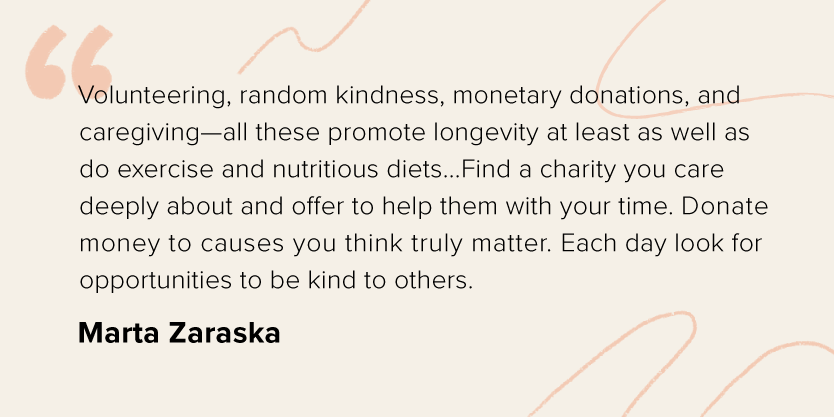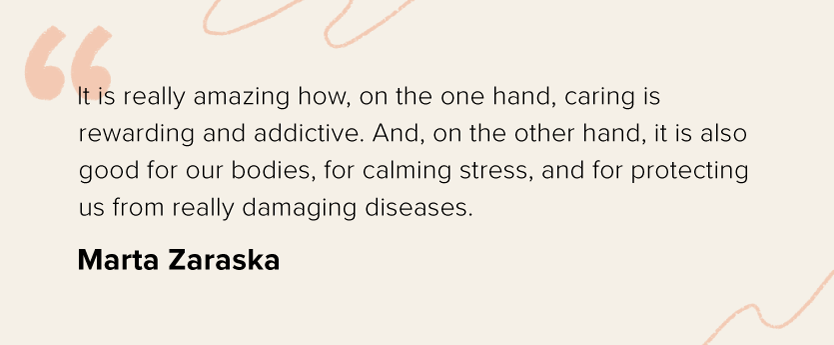The path to longer life can be found by caring for others
February 23, 2021
9 min read
According to research, caring and generosity may partially pave the path to feeling better and living longer.
Are you looking for health and longevity? No need to rush down the health food aisle or jump into the latest fitness craze. Science journalist Marta Zaraska makes this argument in her new book, Growing Young: How Friendship, Optimism and Kindness Can Help You Live to 100.
Finding a purpose, building strong relationships, and caring for friends and strangers alike are three key factors that significantly help boost our wellbeing. According to a number of studies, doing these three things may actually have stronger effects on your health than the way you eat or how often you exercise.
Growing Young maps out how humans are biologically hardwired for helping others.
Zaraska, a self-professed eternal optimist, believes we are all generous and kind at our core. What matters most for your wellbeing is that you can understand or imagine the effect of your giving, even if it is symbolically (like adopting an animal when you donate to a wilderness protection organization).
Zaraska, citing research from Simon Fraser University Distinguished Professor Dr. Lara Aknin and other social scientists, makes the case that the benefits of your generosity are boosted when you feel passionate about a cause. When your good deeds align with your interests, the potency for anti-stress only increases (with an important contraindication: your motivations can’t be rooted in hate for others).
Beyond accessing benefits for your own physical and mental health, you are also making a difference and connecting to others in some way.
“Just look deep inside yourself, find things and causes you truly believe in and that can motivate you on a higher level,” writes Zaraska in Growing Young. “It may be fighting climate change, improving lives of women in Africa, or supporting a local opera—it doesn’t really matter.”

Here is a conversation with the author about what makes us kind and connected—and whether it’s even possible to be too empathetic. This interview has been edited.
Charitable Impact: Do you think humans are naturally kind beings?
Marta Zaraska: I am absolutely convinced of that. We humans are the most social species out there. The reason is that our young are born extremely helpless. This is very, very unusual in the mammal world, how helpless they are. We had to evolve a caregiving system to take care of these extremely vulnerable young. It takes a village and in the past it took a tribe. So we all evolved to be caring creatures.
There is even proof in mathematics that it makes sense to help others. We have evolved this caregiving system, which was designed for helping our young but also got adapted to help other humans—whether it’s your family or your friends or neighbours.
CI: Can you tell me more about the caregiving system you talk about in your book, Growing Young?
MZ: The caregiving system is something that connects parts of our brain—the reward system, the fear centres in our brain—with our fight and flight response and our sympathetic nervous system. It impacts the release of certain hormones in our brain, for example cortisol or adrenaline.
What happens when we are helping others is that our fear centre in the brain, our amygdala, calms down. To help someone else you really have to be calm yourself. If you are panicking, if you are extremely anxious, you really aren’t good at helping another person.
It’s a bit like on the plane, you have to put the oxygen mask on yourself before you can help another person or your child. It is the same with what happens in our bodies, we first help ourselves to calm down and only then we can help others.
Because caring involves calming ourselves, it’s good for our bodies. We know that chronic stress has detrimental effects on us. If you have too much cortisol or adrenaline, in the long term this can lead to certain problems such as diabetes or cardiovascular disease. Whereas, caring calms down those systems and this kind of fight-or-flight response.
On the other hand, what also happens in our brain, how the caregiving system is designed, [is] to be rewarding. So the reward areas of the brain activate, such as the septal area, and make us want to give more.
Our brains are designed to want to care more, to give more. The same areas of the brain that can make us addicted to, say, cigarettes for example, also in a way make us addicted to caring.
It is really amazing how, on the one hand, caring is rewarding and addictive. And, on the other hand, it is also good for our bodies for calming stress and protecting us from really damaging diseases such as cardiovascular disease.

CI: So being kind, helping others and giving are rewarding and good for us overall. What’s better: random acts of kindness or planned giving?
MZ: There was a very interesting study that asked the same question. The researchers asked, “Does it matter whether you are doing random acts of kindness or is some kind of organized volunteering better?” They came to the conclusion they are equal, but what does matter is to help particular people.
You have to know who you are helping. If you are helping anonymous children, it doesn’t give you the same benefit as if you knew which children exactly you are helping. This is that kind of individualized knowledge and it can be very helpful.
Generally, the more concrete and individualized giving is, the more benefits we derive from it.
CI: I guess it comes back to us being social creatures?
MZ: Yes, we didn’t evolve to help some random homo sapiens. We evolved to help our tribe—the people we actually knew—and this is how it still functions. When you know who you are helping, you get the best benefits for both your physical health and your mental health.
CI: It makes me think about arguments that we are becoming increasingly separated from people due to influences like technology. Researchers have been talking about the epidemic of loneliness for awhile now. Do you think that things are getting better or worse when it comes to loneliness?
MZ: I think they are getting temporarily worse. There is no denying that for the vast majority of people the current situation [with the ongoing pandemic] is horrible. We did not evolve to live on our own in lockdowns and communicate over Zoom.
But I have talked to several researchers who have said that, generally, this kind of temporary loneliness does not worry them. This is not the reason people get sick. What is worse is chronic loneliness, something that is really sustained.
If this pandemic lasted much, much longer, then we could start to worry. We know it will hopefully be over soon. Maybe it will also help us reframe the way we live and maybe look more for meaning, purpose, and kindness.
People are looking deeper and searching their souls—and maybe finding the way they did things before the pandemic weren’t the best and they were not prioritizing the right things.
CI: Do you think empathy has a downside and can we be too empathetic?
MZ: No, I don’t think it’s possible. I think it’s a misunderstanding. In general, when people say “I am too empathetic and it’s bad for me”, I think they are misunderstanding what empathy is. They think about problems and what dealing with emotions is.
Empathy doesn’t mean that you have to feel bad. It just means you understand the other person and their emotions. It doesn’t mean that you succumb to some dark moods yourself.
Generally, research shows when people are more empathetic, they benefit from it and everything in their life benefits. So their relationships are better, their friendships are better, their marriages are better, they volunteer more, they donate more to charity.
The research shows that people’s wellbeing improves with empathy.
CI: How does charitable giving factor into all of that?
MZ: Charitable giving can improve both mental and physical wellbeing. There is really fascinating research that shows that even your muscle strength can go up after donating money. There is plenty of research that shows donating money is good, even for our physical health.
In terms of the effects of charitable donations, it’s important that you know the specifics: that you know to whom you are donating, that you know well the organization you are donating to, and that you really understand where the money is going.
Research shows that even thinking about our kind acts is good for our health. So remembering how much we have done actually improves our mental health and wellbeing.
At Charitable Impact, it’s our purpose to help people create the change they want to see in the world. Through an Impact Account you can create your own giving plan and map your own giving journey. Cultivate giving that matches your purpose, your budget, and your life.
You can manage all your charitable giving on the go with the Impact Account iOS app. It’s one app for all your giving. Download your Impact Account app now.
